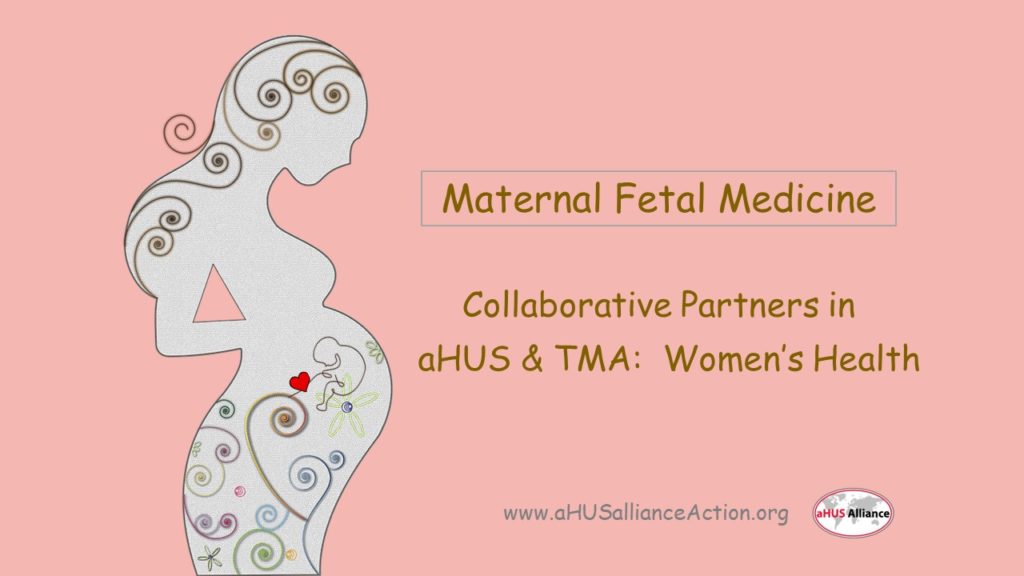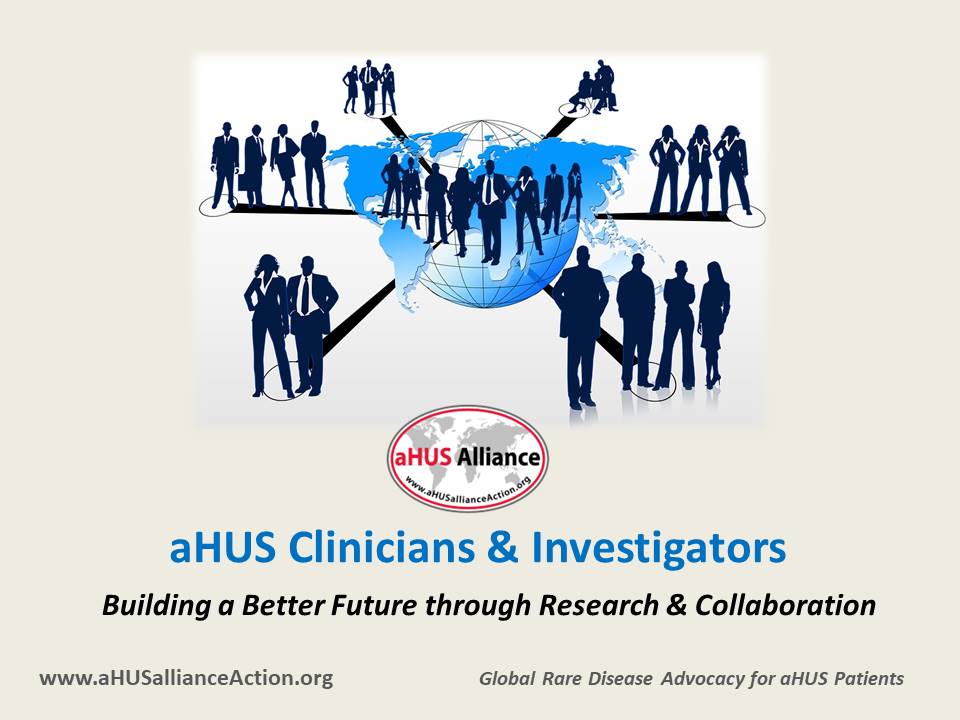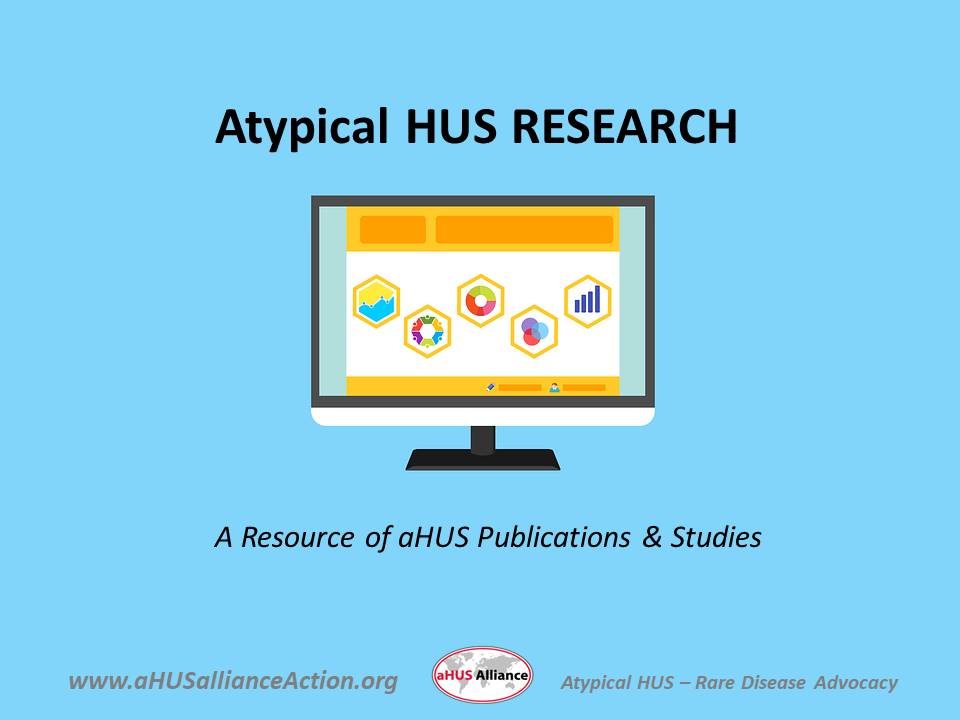
We were pleased to recently welcome Dr Richard Burwick (California, USA) to our global network of aHUS clinicians and investigators. Some may wonder why a physician whose specialty area is the field of Ob/Gyn has become the newest expert listed in our international ‘Doc to Doc’ directory.
Although most people with atypical HUS are treated by specialists in the field of nephrology and hematology, other aHUS patients count as their healthcare team leaders providers from specialty care areas of immunology and oncology. Formation of tiny clots in small blood vessels that damage systems and functions anywhere in the body, with kidneys usually the primary organ affected.
The negative impact of aHUS activity on organs other than the kidneys, known as extra – renal manifestations, may impair body functions which need treatment by neurologists (brain & nervous system), cardiologists (heart), gastroenterologists (GI: stomach & intestines and hepatological: liver, gallbladder, pancreas), pulmonologists (lungs), dermatologists (skin), ophthalmologist (eyes & vision), or other care specialists. Quite logically, those with atypical HUS need to be treated with a multidisciplinary approach due to complex care which may escalate with multiple organ involvement. (FMI: TMA Multidisciplinary Care also On the Need for Multidisciplinary Collaboration)
When someone with atypical HUS becomes pregnant, the situation changes into healthcare needs for two people (or more, such as for twins). Care for mother and chld(ren) can become complex. Obstetrician-gynecologists (OB/GYN) are experts in Women’s Health, with “Maternal Fetal Medicine” as a specialty area trained to care for patients with high-risk pregnancies and prepared to consult with other medical specialists. (Source: ACS, American College of Surgeons). Due to the possibility of multi-organ involvement, an interdisciplinary TMA team approach is important for any aHUS patient but this is even more vital for those who become pregnant (any trimester, as well as postpartum).
Sometimes pregnancy acts as a trigger for a person who is genetically predisposed for aHUS or other forms of thrombotic microangiopathy. With no past history of atypical HUS, such patients may suddenly experience signs of illness and have lab results which in part may show: low platelet counts (thrombocytopenia), destruction of red blood cells (hemolysis), and high creatinine level (sign of poor kidney function). While primary care physicians, ob/gyn professionals, critical care specialists, and emergency room staff all may recognize warnings signs that potentially indicate thrombotic microganiopathy (TMA), the individual presentation and appropriate treatment can be very difficult to differentiate in regard to similar medical conditions.
It’s then that a specialist in Maternal Fetal Medicine is tapped as a consultant to diagnose the root cause, during pregnancy trimesters or postpartum. Were there indications of pre-eclampsia? Could it be HELLP (Hemolysis, Elevated Liver enzymes, and Low Platelet count) syndrome? Or is the underlying condition a form of pregnancy-triggered TMA, such as atypical HUS?
This is why it’s so important to support formation of multi-disciplinary TMA teams in hospitals and across clinical care practices. Time lost in reaching an accurate diagnosis means poor patient outcomes, and in the case of pregnant individuals – make that plural “patients” to encompass both mother and child(ren).
As we welcome Dr Richard Burwick to our global network of aHUS clinicians and investigators, it provides an opportunity to highlight the importance of collaboration among specialists for all people diagnosed with atypical HUS. Our utmost respect and appreciation is offered to all international aHUS experts listed, who volunteer their time and talents to collaborate with medical professionals seeking consultation regarding management of atypical HUS.
Among the publications listing Dr Burwick as contributing author are these related to aHUS and pregnancy:
Gupta M, Govindappagari S , Burwick RM. Pregnancy-Associated Atypical Hemolytic Uremic Syndrome: A Systematic Review. Obstet Gynecol. 2020 Jan;135(1):46-58. doi: 10.1097/AOG.0000000000003554. PMID: 31809447; PMCID: PMC6922068.
Burwick RM, Moyle K, Java A, Gupta M. Differentiating Hemolysis, Elevated Liver Enzymes, and Low Platelet Count Syndrome and Atypical Hemolytic Uremic Syndrome in the Postpartum Period. Hypertension. 2021 Sep;78(3):760-768. doi: 10.1161/HYPERTENSIONAHA.121.17311. Epub 2021 Jul 19. PMID: 34275337.
Gupta M, Feinberg BB, Burwick RM. Thrombotic microangiopathies of pregnancy: Differential diagnosis. Pregnancy Hypertens. 2018 Apr;12:29-34. doi: 10.1016/j.preghy.2018.02.007. Epub 2018 Feb 16. PMID: 29674195.
Burwick RM, Feinberg BB. Complement activation and regulation in preeclampsia and hemolysis, elevated liver enzymes, and low platelet count syndrome. Am J Obstet Gynecol. 2022 Feb;226(2S):S1059-S1070. doi: 10.1016/j.ajog.2020.09.038. Epub 2020 Sep 25. PMID: 32986992.
Regal JF, Burwick RM, Fleming SD. The Complement System and Preeclampsia. Curr Hypertens Rep. 2017 Oct 18;19(11):87. doi: 10.1007/s11906-017-0784-4. PMID: 29046976; PMCID: PMC5849056.Regal JF, Gilbert JS, Burwick RM. The complement system and adverse pregnancy outcomes. Mol Immunol. 2015 Sep;67(1):56-70. doi: 10.1016/j.molimm.2015.02.030. Epub 2015 Mar 21. PMID: 25802092; PMCID: PMC4447554.
Richard Burwick, MD, MPH Associate Professor of Maternal Fetal Medicine, San Gabriel Valley Perinatal Medical Group, Pomona Valley Hospital Medical Center, Pomona, CA (USA)
View our global network of aHUS Clinicians & Investigators

The aHUS Alliance Global Action team maintains a virtual ‘library’ of over 950 aHUS-related research articles and publications, to include an entire section of 70+ publications related to aHUS & Pregnancy.

Our Website has featured 100+ articles that include the mention of aHUS & Pregnancy, to include this group among many where it is the key topic.
Can aHUS relapse in Pregnancy?
The right choice -Pregnancy and aHUS

